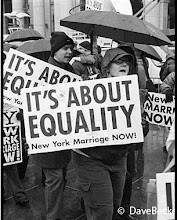The article that i read is called "Gay Rights". the article talks about how gays have always been discrinated against, but when people came out in the 1970's they have the legal rights to equal employment, and partner benefits, which are things that they did not have before that. Discrination is traced back as far as 1533 in england, when they passed the Buggery act. the buggary act "made homosexual intercourse a capital offence punishable by hanging". this caused most homosexuals to hide it because they were scared of the repracussions. closer to the 20th century more of the homosexuals became more open about their sexuality. As more people became open about their homosexuality people started to see it as a problem, and it was viewed as deviant behavior, and a threat to the stibility of American Culture. Gays soon became an open target for the police to arrest them for something. More than 500 gay men were being arrested in New York annualy. By limiting the presence of the homosexuals in the public scene the state authorities thought it would be a good idea to put homosexuals into invisability. Everything started to change for homosexuals in the 1970's when activists began to challenge the federal and state laws. The Lawrence v. Texas (2003) case changed alot, it changed the antisodomy laws to be unconstitutional. even after the Lawrence v. Texas the antisodomy laws were still in the books in thirteen states, most of which were in the south. then in 1986 the Bowers v. Hardwick case argued that the right to privacy did not extend to the homosexuals, the court agreed with them, but seventeen years later that was overturned. everything started to turn over for the homosexuals after that. In the year 2000 the state of Vermont was the first state to legalize same-sex unions. Then in San Francisco marrige liscenses were being given to same-sex couples, but that was soon put to a stop, and those marrige licenses that were given out became illegal. In the 2004 election banning gay marriges became a heated topic in the political debates. 11 states most of which were red states (republican) voted to amend the constitution to ban gay marrige. Most of the dificulties that gays and lesbians have had over the years is trying to legalize same-sex marriges and relationships. Today there are more then 30 million gays and lesbians in the United States are fighting for social, economic and political rights. The question that i have is, will homosexuals ever get the rights that they have been fighting for for many years?
"gay rights." American History. ABC-CLIO, 2010. Web. 29 Jan. 2010. ."gay rights." American History. ABC-CLIO, 2010. Web. 29 Jan. 2010. .




















